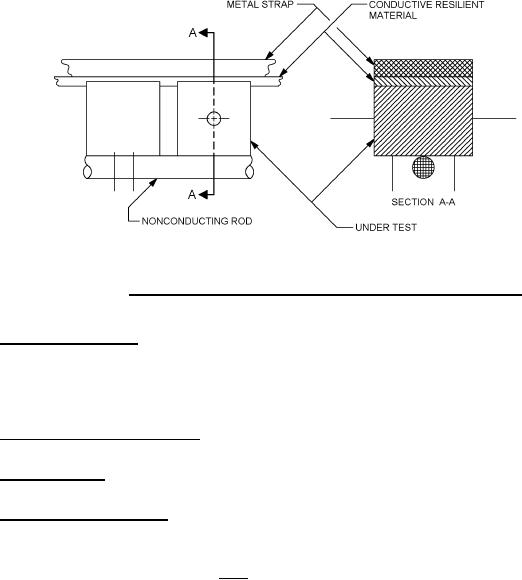
MIL-PRF-21038F
FIGURE 1. Transformer contacting assembly for mounting during polarization
4.7.14 Solderability (see 3.17). Transformers shall be tested in accordance with MIL-STD- 202, method 208.
Sample units used for solderability shall not have been soldered during any of the previous tests. A minimum of
two terminals of each terminal type for the individual part shall be tested.
NOTE: Solderability is considered a destructive test and samples subject to solderability shall not be supplied
as conforming units on contract. Electrical rejects or dummy transformers can be used for solderability testing.
4.7.15 Resistance to solvents (see 3.18). Transformers shall be tested in accordance with MIL-STD-202,
method 215. The marked portion of the transformer shall be brushed.
4.7.16 Fungus (see 3.19). Unless certification is provided, transformers shall be tested in accordance with
MIL-STD-810, method 508.
4.7.17 Temperature rise (see 3.20). Unless otherwise specified (see 3.1), the temperature rise test shall be
performed on transformers rated at more than 0.8 watt average output. The temperature rise of each winding
shall be based on the change-in-resistance method and shall be computed by the following formula:
R-r
ĆT =
(t + 234.5) - (T - t)
r
Where:
ĆT =
Temperature rise in degrees centigrade above specified maximum ambient temperature
(see 3.1).
Resistance of winding in ohms at temperature (T + ĆT).
R
=
r
=
Resistance of winding in ohms at temperature (t).
t
=
Specified initial ambient temperature in degrees centigrade.
T
=
Maximum ambient temperature in degrees centigrade (at time of power shut-off). "T" shall
not differ from "t" by more than 5°C.
10
For Parts Inquires submit RFQ to Parts Hangar, Inc.
© Copyright 2015 Integrated Publishing, Inc.
A Service Disabled Veteran Owned Small Business